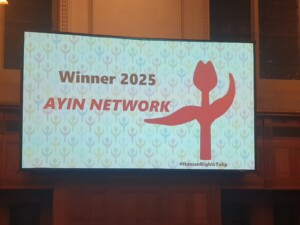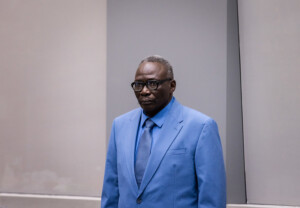Sudanese activists demand Al Bashir be transferred to ICC
On Friday, a group of Sudanese activists living in and the Netherlands and elsewhere in the diaspora presented an open letter to the Office of the Prosecutor of the International Criminal Court (ICC), as part of a campaign to have the deposed dictator Omar Al Bashir and his co-accused extradited to face the ICC in The Hague on charges of war crimes, genocide, and crimes against humanity.
 Activists demonstrate at the International Criminal Court in The Hague on Friday (Picture: Supplied)
Activists demonstrate at the International Criminal Court in The Hague on Friday (Picture: Supplied)
On Friday, a group of Sudanese activists living in and the Netherlands and elsewhere in the diaspora presented an open letter to the Office of the Prosecutor of the International Criminal Court (ICC), as part of a campaign to have the deposed dictator Omar Al Bashir and his co-accused extradited to face the ICC in The Hague on charges of war crimes, genocide, and crimes against humanity.
The activists demonstrated outside the International Criminal Court before delivering the open letter by hand.
Al Bashir has already been convicted of currency offences, and given a custodial sentence by a Khartoum court, but as he still faces charges in Sudan, he remains incarcerated in the notorious Kober prison in Khartoum North, where so many of his opponents were detained and tortured during the 30 years of his repressive regime. Al Bashir was indicted for crimes including genocide nine years ago.
The Prosecutor of the International Criminal Court (ICC) told the UN Security Council last week during her briefing on Sudan that “concrete steps” must be taken towards ending impunity for atrocity crimes in Darfur,
In her 30th report to the UN Security Council, ICC prosecutor Fatou Bensouda, said that, “emboldened by positive political changes over the last six months, since the overthrow of former dictator Omar Al Bashir, that include a Constitutional Declaration, and a new Sovereign Council and Cabinet, she expressed her hope that “Sudan will honour its commitments to deliver justice” for the victims of civil conflict in the restive Darfur region, stretching back decades.
During the Darfur conflict between the government, their militiamen allies and rebel groups, which began in 2003, the UN estimated that around 300,000 were killed, and around 2.7 million forced from their homes.
Full text of the Open Letter to the Office of the Prosecutor of the International Criminal Court:
The institutions in Sudan have become too fragile to maintain peace and security or to administer justice impartially and independently because, during the 30 years of the Omar Al Bashir dictatorship, the regime infiltrated these institutions with their affiliates and cadres.
Despite that change and the aspiration for peace, democracy, and justice in Sudan, the millions of victims of International Human Rights and International Humanitarian Law violations have become more concerned about the possibility of administering justice.
For 30 long, dark years, the deposed regime that was widely known for its grave violations of International Human Rights and International Humanitarian Law destroyed almost everything valuable in the country. The former regime destroyed not only the socioeconomic values but extended to the entire judiciary system. Hence, it may not be impossible but will surely require many years of legal reforms before the Sudanese judiciary system is competent to try serious crimes such as crimes against humanity and war crimes or genocide.
The Sudanese transitional government seems inclined to opt for national prosecutions despite the obviously incompetent, unable, and partisan nature of the judiciary system. Although Sudan can rely on the complementarity principle to try Al Bashir and others indicted by the ICC, the question remains whether Sudan will be able and willing to do so. The International Commission of Inquiry on Darfur in 2005 and the ICC assessment proved that Sudan is unable and unwilling to address such serious crimes committed in Darfur.
The recent change in the country has brought hope for justice, peace, and prosperity. However, such hope is at stake with such powerful perpetrators as Haroun, Al Bashir, and others still at large. The recent violence in El Geneina in West Darfur is a perfect example of how easily the hope for justice and peace can be dissipated.
We appreciate the continuous efforts of the Court to bring those individuals responsible to trial, and to deliver justice to the victims who have been waiting for it for so long.
For these reasons, we call upon the Office of the Prosecutor to ensure that Al Bashir and others indicted by the ICC stand trial at the ICC. The prosecutor should request Sudan’s new interim government to hand over those responsible for the crimes committed in Darfur, and other regions in Sudan, in particular, those indicted by the Court.
Signatories:
1. Dr Iman Ahmed, human rights activists, Consultant, World Health Organization.; 2. Dr Bakry M. Elmedni, assistant professor in the MPA Program in the School of Business, Public Administration and Information Sciences.; 3. Professor Sharif Harir, a lecturer, Researcher and Writer; 4. Adeep Abdelrahman, SUDO; 5. Mohy Eldeen Omer, Program Officer at National Democratic Institute (NDI); 6. Barcai Abdel- Karim President End-Impunity Organization; 7. Mohammed Abdelkriam, a lawyer and human rights defender; 8. El Sadig Mustafa Zakaria, Darfur Bar association; 9. Mohammed Adam Hassan, Darfur Network for Monitoring and Documentation; 10. Ibrahim Hamoda, Journalist; 11. Fethy .Lawyer head of Phanaar Organisation; 12. Abdulaziz Hussein Ahmed hamad; 13. Mohammed El Gizoly Adam/ Human rights legal researcher; 14. Abdelhadi Abbaker, Activists and human rights defender; 15. Osman A Jami Secretary General of End Impunity Organization- Khartoum- Sudan; 16. Afraa Yahia Daffalla Adam, activists and women rights advocate; 17. Isaad Mohamedani, activist, former head of Darfur Association in the Netherlands, and women rights advocate; 18. Ahmad Osman; 19. Mohamed Khalil, activist; 20. Mudaw Abubakar, Activist; 21. Khalid Abdalh, Journalist and a former Darfur association in the Netherlands; 22. Yousif Ibrahim Fasher; 23. Abdel Rahman Adam Abdel Rahman, Entrepreneur and Peace Activist; 24. Mohammed Abu Abdallah, Political activist; 25. Rashid Almohammed, activist; 26. Jamaleldeen Mohamed Adam; 27. Ahmed Guma, lawyer & human rights defender; 28. Abdlmajed Bahr, activist); 29. Mohamed Ibrahim; 30. Nejmaldin Ahmed Yacoub; 31. Ahmed Adam; 32. Darasalam Abdulla; 33. Adam Idris Yahya; 34. Yahya ishak ismeal; 35. Ismail Motasam; 36. Adma Adam Mohamed; 37. Zakia Yousif; 38. Ibrahim Adam Bashir; 39. Ali Ahmed; 40. Ismail Motasam; 41. Sadam Adam Omar; 42. Adma Adam Mohamed; 43. Gmal Zakria, Human rights activist; 44. Ahmed Mohamed Idris; 45. Issam ahmed saleh; 46. Yasir Khalil; 47. Sinan Abdulrhman; 48. Alsadiq Mohieldeen Ibrahem; 49. Hala El-bushari.; 50. Mohammed Abu ABDALLAH, Political activist; 51. Rashid Almohammed, activist; 52. Musab Shaib Zeinelabdeen ,Case manager, and human rights activist- Projekte resettlement.de Deutschland; 53. Bella Kodi, SPLM-N; 54. Muhammad Ali Muhammadu, Journalist; 55. Abdul Rahman Osman Muhammad, researcher and university lecturer; 56. Abduerhman A H Deiges Secretary General of the Association of Darfur in Norway; 57. Hassan Abdul Karim Abdullah, political activist; 58. Mahmoud Mohamed Korina, Political activist; 59. Jamal Abdulrahman Saeed. Activist in the field of peace and human rights.; 60. Munir Muhammad Suleiman, Information Technology Engineer; 61. Salah Mohamed Suleiman, Engineer; 62. Hassan Ishaq Ahmed, journalist and writer; 63. Moatasem Hamdan; 64. Ammar Najmuddin Hussain, human rights activist; 65. Jaafar Al-Sibki Ibrahim, a member of the International Federation of Journalists; 66. Mustafa Tambor, political activist; 67. Abdel Razek Mastour Mohamed, Sudanese citizen from Darfur; 68. Talal al-Junaid, Activist; 69. Mostafa Mokhtar Mohamed, Vice-President of the Duane Organization in France, a human rights activist; 70. Awatef Ahmed Ishaq – activist and human rights defender – journalist – women against violence, women of change group; 71. Taj Alsir Hussain is a journalist and political activist.; 72. Mustafa Sri Soliman UK – Manchester Journalist; 73. Yasir Adam; 74. Jamal Alnor, Activist; 75- Mohammed Salih Abdallah Yasin Journalist; 76- Hmadi Musa Abdallah; 77- Yasin Adam Ahmed, Activist; 78- Mohammed Abdulrahman, Activist; 79- Eisa Mustafa , Former Chairperson Darfur Union, Netherlands,; 80-n Alhaj Altom, Human rights defender; 81- Ahmed Eisa Ano, ACTIVIST; 82- Faisal Adam Suliman, Activist; 83- Hamid Hajer , Politician; 84- Ahmed Siraj , Lawyer; 85- Dr Ibrahim Mohammed, lecturer; 86- Jamal Alzain Kabashi, Activist; 87- Bakhit Hamid Basher, Politician; 88- Salih Mohammed , Activist; 89- Siddig Fadol, Chairperson of the Nubian Club; the Netherlands; 90- Alsadig Khamis, member of the Revolution Front; 91- Male Awad, Activist; 92- Najim Krkor, Activist, Israel; 93- Elyas Hussin, Teacher, Kalma Camp; 94- Jamal Idriss, Activist; 95- Laila abdalla, Director of Hawa Organisation,; 96- Sadam Adam , Activist; 97- Masour Ahmed , Activist; 98- Alsadig Musa, Activist; 99- Abelslam Babiker, Activist,; 100- Mohammed Abdallah Anas, Activist, Kenya,; 101- Maajid Ismail, Activist; 102- Nagmeldin Haron, Activist; 103- Niemat Abdo, Member of women for Peace and Security; 104- Isam Taha, member of Sudanese Communist Party,; 105- Slah Idriss Omer; 106- Abuhurira Abdelrahman, HRDs; 107- Muaawia Ibrahim, Activist; 108- Anwar Suliman, Activist; 109- Abdulaziz Mokhtar, Lecurer, South Africa,; 110- Faisal Elbagir, journalist and Human Rights Defender,; 111- Tagwa Ahmed
Radio Dabanga’s editorial independence means that we can continue to provide factual updates about political developments to Sudanese and international actors, educate people about how to avoid outbreaks of infectious diseases, and provide a window to the world for those in all corners of Sudan. Support Radio Dabanga for as little as €2.50, the equivalent of a cup of coffee.












 and then
and then